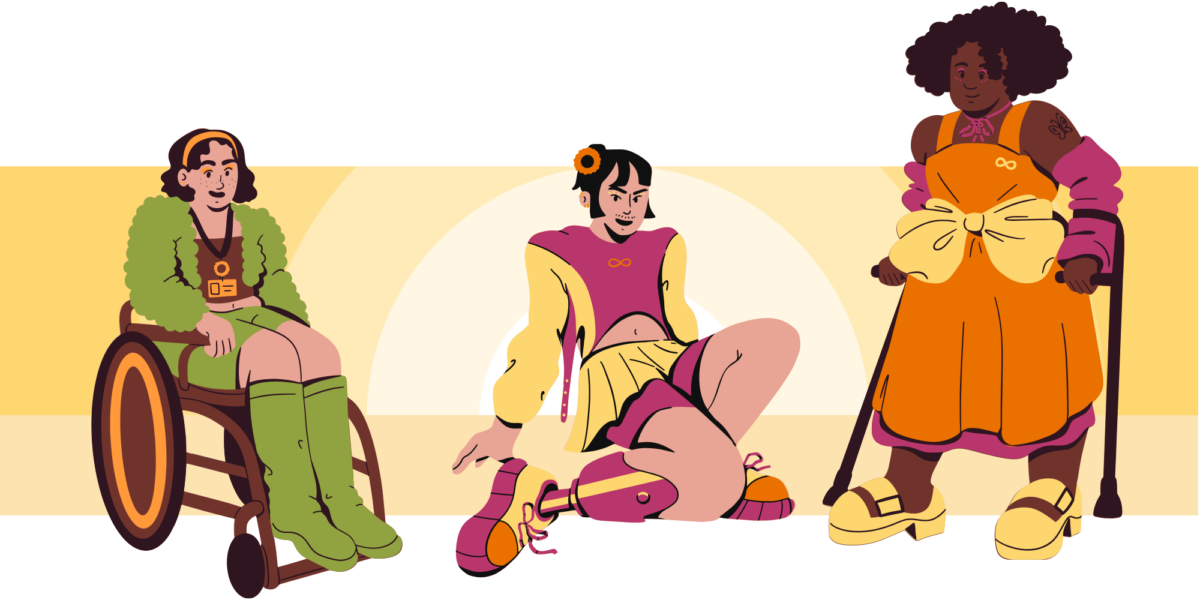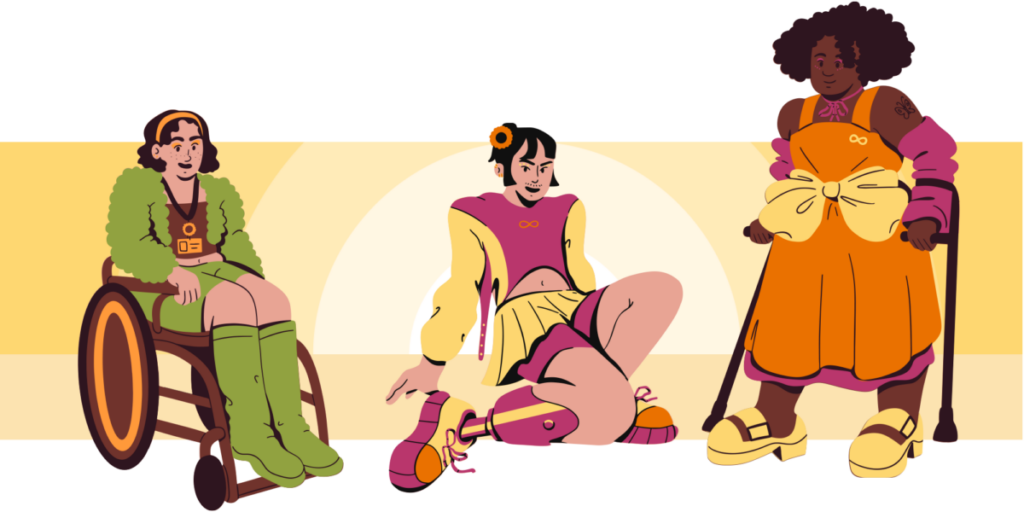
Disabled and Deaf people deserve to have our stories shared with compassion and dignity, with our expertise about our own lives amplified and respected. Yet bad actors across the political spectrum[1] have a long history of espousing ableist, eugenicist rhetoric[2] that permeates the media cycle, leading to harmful and often dangerous stories about disabled people. Ableist systems, such as the criminal legal system, medical industrial complex, and even disability services uphold laws and policies aimed at controlling or removing disabled and Deaf people from society. Drawing from eugenic ideology, these ableist systems are designed to dispose of BIPOC, low-income, disabled, and Deaf people en masse wielding the ideology that we as people are inherently inferior to able-bodied, white, wealthy, cisgender, heterosexual men. This perception that our lives are “inherently inferior” and that we therefore represent a clear and present threat to the status quo is used as a means to justify the removal of disabled and Deaf people from society, quickly and cheaply. In order to build a world where everyone can thrive, disabled or not, we must protect and enhance vital systems that support our community’s short term survival, long-term wellbeing, and autonomy.
As journalists, you have the responsibility and the means to interrupt ableist[3] rhetoric which, left unchecked, can have fatal consequences for disabled people. In doing so, you create an opportunity to amplify anti-ableist narratives that increase understanding and respect for our communities. This helps pave the path to a future where disabled peoples’ dignity, autonomy, and survival is regarded to be equally as important as everybody else’s, regardless of our ability to produce under capitalism.[4]
Laying the Foundation:
A Brief Intro to Eugenics
In recent years, journalists have become increasingly skilled at analyzing issues through the lens of race, class,[5] and to some degree, gender.[6] However, there remains an urgent need to broaden this analysis to also include disability, ableism, and in particular eugenics.[7] Contrary to popular belief, eugenics is still common even within the US[8]— both ideologically and in practice. Following widespread condemnation in the back half of the 20th century, eugenics simply became less obvious but no less dangerous.
History of Eugenics
The logic behind eugenics[7] is the belief that certain genes cause “moral delinquency” and threaten the superiority of the white race—and as such pose a threat to the purity of a nation-state and should be eliminated. Eugenics is used as an ideological and moral justification for the system of capitalism, which requires the establishment of an undesirable and disposable population[9] in order to function. The purpose of this population is to produce free or cheap labor to meet the needs of the capitalist system. Supporters of eugenics used ableism to spread the idea that disabled people are dangerous, harm the economy, and pose a threat to the nation’s “genetic health” and “moral integrity.” This supremacist and violent ideology both sends the widespread message that disabled peoples’ lives are not worth living, and fosters an environment for violence to be enacted against disabled people.
A crucial component of eugenics is targeting disabled people who have “undesirable traits” with state control, sterilization or even elimination. However, over time, eugenicists broadened their targets by including categories such as “feeblemindedness,”[10] “sexually deviant” and “inherited criminal tendencies”[11] in their list of undesirable traits. These terms were intentionally left vague so they could be used to control or remove large groups of “undesirable” people—ultimately supporting white supremacy,[12] consolidating the power of the wealthy elite, and justifying punitive immigration laws[13] among other projects.
Modern Eugenics
Journalists have the means, opportunity and responsibility to reject modern-day eugenicist rhetoric.[14] Furthermore, journalists should seek to expose the way our political leaders, certain medical practitioners and associations, and certain geneticists uphold eugenic,[15] capitalist, ableist, and misogynistic[16] ideals of whose lives are worthy of dignified, self-determined care. Journalists should also explore how these ideologies are used to pre-determine whose lives are deemed worthy of living.
Tips for Reporting on Disabled Communities
01 Shift Away from Ableist Frames
Even well-intentioned journalists often unknowingly amplify harmful notions about disabled communities. In order to create an anti-ableist media landscape and build trust with disabled communities, journalists must begin with understanding how to identify harmful frames and commit to replacing them. Disabled people are experts on our own experiences. As such, journalists should position us front and center in any coverage of our communities, which means always interviewing and engaging marginalized disabled leadership.
Abandon Sensationalized Storytelling
Disabled people in media are often portrayed in multiple negative ways, including: objects of pity,[17] incapable of self determination, burdens on society, violent and unpredictable, child-like, and gifted or inspirational, often called “inspiration porn.”[18]

- Incapable of self-determination
- Burdens on society
- Violent and unpredictable
- Gifted
- Inspirational, often called “Inspiration porn”
- Child-like
- Objects of Pity
Inspiration porn infantilizes us by portraying our everyday activities as heroic, remarkable, or exceptional. Inspiration porn perpetuates an expectation that disabled people must be inspiring to be worthy of resources, dignity, and respect. It is also notable how anti-Black racism and white supremacy show up in this type of reporting. White disabled people are more commonly those portrayed as inspiring, pitiful or gifted, whereas Black disabled people are more likely to be those portrayed as violent, unpredictable, and incapable.
By abandoning sensationalized frames such as these, journalists create room for nuanced storytelling about disabled peoples’ everyday lived experiences.
Avoid Minimizing Violence Against Disabled People
When disabled people are viewed as disposable, killings of disabled people are routinely dismissed as either unimportant news, or justified because of their disability. Disabled people experience violence at significantly higher rates than our able-bodied peers.[19] This risk is compounded for individuals who are also BIPOC,[20] queer and trans, and poor or low-income.
A common cause of death for disabled people that often goes un/under-reported are “mercy killings.”[21] So-called “mercy killings” happen when a guardian or caregiver, often parents, murder their disabled child because they view the child as “too burdensome” to take care of. Mercy killings are justified through the beliefs that disabled people’s lives aren’t worth living, that killing us is an act of mercy, and that we are burdens on family, community, and the state. Mercy killings can include parents that allow their disabled children[22] to make the decision to die by assisted suicide because the child doesn’t imagine, and are not supported to imagine, a future in which they live a fulfilled, dignified, and full life. These murders need to be taken just as seriously as murders of nondisabled children. As journalists, you have a unique opportunity to bring attention to this type of violence and the eugenic, ableist logic that upholds it.
The intersections of disability, race, class, and gender must be explored and explicitly named by journalists when reporting on violence. During the 2020 uprisings, there was an influx of reporting on police murders of Black people. What often wasn’t reported were the fact that many of those who were and are killed by the police are disabled, and that ableism played a part in the violence that they experienced.[23] This was a missed opportunity, and it is necessary moving forward for journalists to understand, name and report on how ableism intersects with anti-Black racism, misogyny, and white supremacy to fuel violence against disabled people, impacting disabled BIPOC, low-income, poor, queer and trans, and migrant communities particularly.
Disabled peoples’ lives are inherently of value and journalists should treat violence against disabled communities every bit as seriously as violence against nondisabled people.
Highlight our Right to Self-Determination and Autonomy
Disabled people are deserving of the same rights, privileges, and freedoms as other people. Disabled people, like all other people, deserve the right to live full, complete lives as our authentic selves—free from rigid expectations of how other people believe we should be or behave. Journalists should report on the societal changes necessary in order for disabled people to be able to achieve self-determination and agency. Find suggestions for how to do this below.
02 Center BIPOC, Poor, and Low-Income Disabled people
We know all forms of oppression are inextricably linked, making it impossible to tell where one form ends and another begins. As such, journalists should be encouraged to report through the lens of multi-issue disability politics, addressing ableism at the same time as anti-Blackness, classism, misogyny, transphobia, eugenics, and beyond.
Draw Connections Between Ableism and Anti-Black Racism
Racism is the ideology that works to subordinate specific people, while ableism is the means for achieving that goal.
George Yancy, Truthout[24]
When reporting on disabled communities, it is critical not only to make clear how ableism is underscored by anti-Blackness[25]—but also to illustrate how ableism impacts Black people specifically.
Ableism:[26] a system that places value on peoples’ bodies and minds based on societally constructed ideas of normalcy, intelligence, and excellence.
Contextualized within a society where anti-Black racism is structural, systemic, and ideological, both the State and everyday civilians routinely treat Black people as inferior, abnormal, and unintelligent. As such, ableism impacts Black people whether or not they identify as disabled.
One example is how law enforcement and other proponents of the criminal legal system routinely leverage ableism as an excuse to justify disappearing,[27] injuring, and killing Black people.[28]
Draw Connections Between Ableism and Transphobia
Disabled and transgender people experience similar oppressive conditions within both systems of ableism and transphobia:
Including the voices of trans disabled people will help connect these issues for your audience. Individuals who experience additional forms of oppression—such as racism, anti-Blackness, classism, misogyny and xenophobia—can contribute even deeper nuance.
Transgender people also experience discrimination in housing, healthcare, workplaces, the criminal legal system, and beyond, which can both cause new disabilities and amplify existing ones. This is particularly true for Black trans women and femmes, who experience each of these institutions at the intersection of anti-Blackness and transmisogyny,[29] as well as Black trans people more broadly.
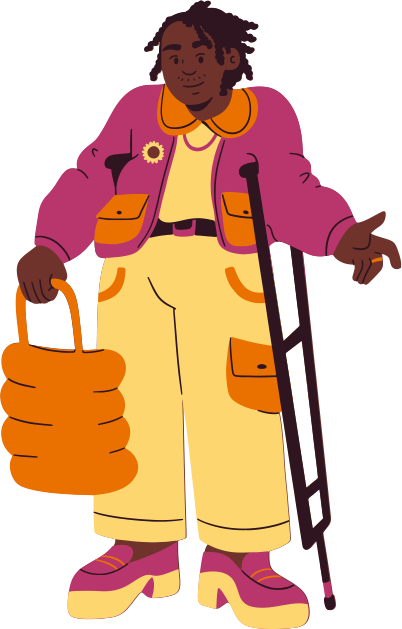
Draw Connections Between Ableism and Classism
Like race and gender, class permeates every aspect of our lives and experiences. Journalists should aim to examine how class and poverty shape experiences of ableism, as well as how disability influences experiences of classism.
Fast Facts to Highlight:


Disabled people are more likely to become unhoused, with an estimated…


03Draw Attention to the Systems that Place Disabled People in Harm’s Way
Disabled people are twice as likely to experience violence[19] as nondisabled people. Our society’s default response to most violence is to incarcerate the individual(s) responsible, rather than meaningfully interrogate the systemic factors that placed the victim(s) in harm’s way.
This is reflected in media coverage,[34] which routinely encourages folks to call police and equates justice with imprisonment. However, because our communities are already heavily criminalized and surveilled, we know that calling the police is often unsafe and can lead to further violence. We also know that removing individuals who have caused harm from society does nothing to prevent further violence from occurring, nor does it dismantle the ableist, racist systems that lead to such violence.
Journalists should always seek to contextualize ableist incidents, disability-specific violence, abuse, exploitation, and mistreatment within the context of how ableist systems perpetuate this harm. In doing so, you illustrate the need to meaningfully reckon with, reimagine, and replace these systems with accountability mechanisms. These mechanisms should include resourcing disabled communities to recover, rest, and gather the space and resources needed to build alternatives that erode the power of ableism, safeguard us from continued harm, and improve material conditions for all people across the breadth of disabled lived experience.
Expose Systems that Remove Disabled People From Society
All people deserve the support we need to thrive in every space we enter—whether or not we are disabled. But rather than create robust support systems that enable disabled people to exist with equity alongside our nondisabled peers, the prevalence and power of ableism in all systems causes us to be siphoned into under-resourced, isolated, and often harmful spaces. Simply put: rather than adequately resourcing people and communities, the “Disability Carceral State” disappears people. Journalists have a long legacy of exposing institutional harm and corruption. We encourage you to continue to be bold, investigate these institutions deeply, and shine a light on the harm they cause to disabled communities specifically.
Examples of spaces into which the state siphons disabled people include:
- Sheltered workshops[35]
- “Special” education classrooms[36]
- Jails and prisons
- Police disproportionately funnel unhoused disabled people into jails and prisons by leveraging archaic laws that criminalize poverty, homelessness,[27] and experiencing a disability in public.[37]
Fast Facts to Highlight:


Journalists can act in solidarity by sharing stories about disabled peoples’ experiences within these institutions. For example, when covering extended solitary confinement,[40] be sure to interview queer, trans, BIPOC, and disabled people, who are subjected to this documented form of torture[41] with alarming regularity.
Expose the Causes and Prevalence of Police Violence Against Disabled People
Even when not incarcerated, police disproportionately target disabled people with violence and harassment.
Fast Facts to Highlight:



Expose the Practice of Placing Disabled People Under Conservatorship
Each of us deserves the autonomy to make decisions about all aspects of our lives. Yet the criminal legal system routinely takes this right away from disabled people and grants it to a parent, guardian, or court-appointed individual with no prior relationship to them—a practice known as conservatorship or guardianship. Sharing about disabled peoples’ experiences living under conservatorship[44] helps illustrate the critical need to end this archaic practice.
Fast Facts to Highlight:


Expose Institutions or Individuals Who Perpetuate Ableist Ideas or Policies and Follow the Money.
Since 2021, journalists have published a number of exceptional investigative pieces exposing the role of far-right lobbyists[46] and billionaires[47] in the proliferation of anti-trans legislation. We know a small group of wealthy, powerful people and their interests play a similar role in the continuation of ableist systems, such as Acadia Healthcare and their alleged practice of increasing revenue by holding patients against their will.[48]
Journalists can play an important role in increasing the level of familiarity people have about how ableism functions. Journalists should also highlight how ableism works in tandem with other supremacy systems, uplift disability-led efforts seeking to end the harm these systems cause, and push back on negative attitudes or incomplete, one-dimensional portrayals of our vast, nuanced, and tenacious communities. Additionally, there remains a deep need for investigative journalists to expose ableist, supremacist institutions and individuals who benefit from them. This might look like asking:
04Emphasize Self-Determination and the Necessity of Disabled Peoples’ Leadership.
Marginalized disabled people bring a cultural knowledge and political analysis of the essential truth that dependency is a natural and valid experience of humanity.
While we are critically aware that many disabled people are dependent on problematic systems, it is critical to present readers with tangible solutions where they exist to support the self-determination, dignity, and agency of all people, regardless of our ability to produce profit for the wealthy.
Disabled people are experts in our own experiences. We have been creating culture and implementing practices of self-determination, community care, and supported autonomy for generations, without broad structural support. Telling stories that uplift these truths with credible sources illuminates our resistance to harmful systems. You have the power to increase familiarity and respect for these methods of resistance. This will amplify the leadership of disabled people, recentering the truth that those closest to the problem are often closest to the solutions. We have always existed due to our own community’s ability and tenacity to create methods of survival and care for ourselves, a practice that we will continue well into the future.
Journalists should seek to amplify the complexity of marginalized disabled peoples’ lives, and our struggle to actualize the right to self-determination and live a life with dignity and respect.
Highlight the Need for Universal Benefits
By emphasizing the need for universal benefits,[49] coupled with the abolition of income and asset limits[33] for people receiving Supplemental Security Income (SSI), you can increase buy-in for these solutions and in turn increase pressure on our lawmakers to make them a reality.
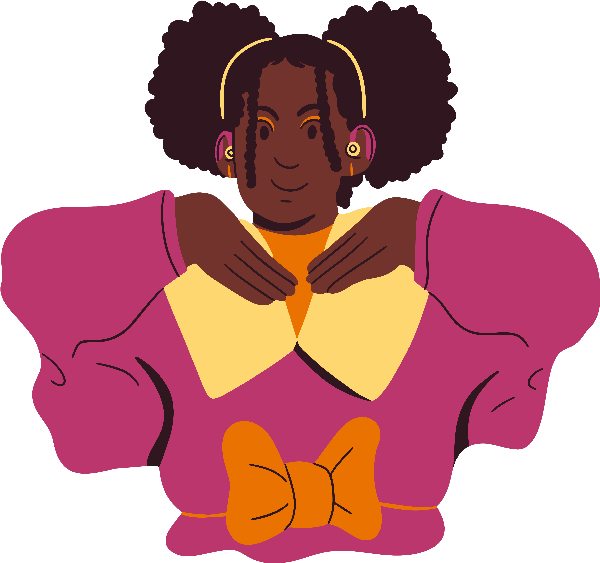
Uplift Disability-Led Organizing and Highlight Key Victories
Everyone deserves access to the care, support, and resources we need to thrive. We know lawmakers have long neglected to enact the legislation necessary in order to meet all peoples’ basic needs, prioritizing the financial interests of an elite few over the needs of the majority.
We as disabled BIPOC, queer/trans, low income, and migrant communities know that organizing works. Disabled community organizing successes span across climate justice,[50] disaster relief,[51] COVID safety,[52] technology justice,[53] labor organizing,[54] the recent consideration of the abolition of subminimum wages,[55] and much more. By highlighting key successes, journalists help build trust and consequently engagement with the community whose work, strategy and organizing these successes result from.
Conclusion
As journalists you have immense power and a strategic role to play in dismantling ableist systems, ideologies, and practices. Whether it be by challenging ableist stereotypes of disabled people, covering a story using an intersectional analysis that includes ableism, or reporting on disabled communities’ successes with dignity and respect, we need you in this fight.
As the wealthy elite continue to leverage ableism to consolidate their power, the use of ableist and eugenic logic, laws, and practices will continue to increase. In this time of innumerable attacks on the bodily autonomy of many, the leveraging of ableism to justify and accelerate these attacks will become subtler and more broadly applied. It is imperative that as journalists, you work in ways that erode the power of this behavior by providing accurate, nuanced and pro-disability reporting that follows the expertise and analysis of the most impacted disabled people.
Disabled people are not burdens. Disabled people are not inherently a threat. Most importantly, disabled people deserve to live. Our disabled lives are worthy of living fully in all of our glorious quirks, varieties, and idiosyncrasies, and we deserve systems that allow us to thrive while getting the care we deserve with dignity and respect.
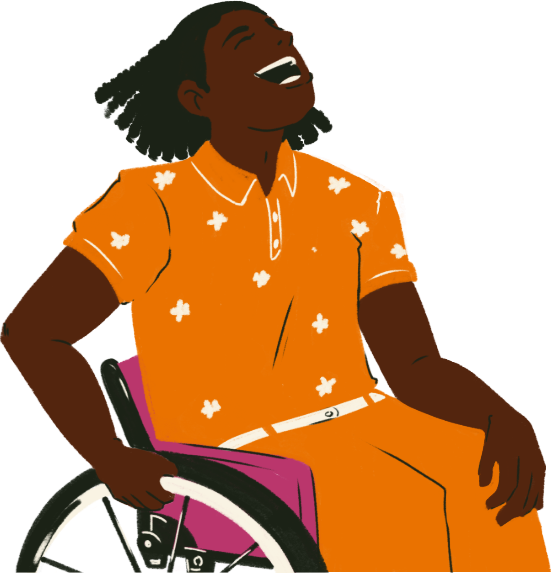
05Research Beyond This Guide
The tips housed within this guide and the external resources hyperlinked throughout seek to provide the foundational knowledge needed to report sensitively, accountably, and accurately on disabled communities. However, we know language, culture, and communities themselves are constantly evolving. As such, we encourage journalists to continue researching beyond this guide, including:
Laying the Foundation:
A Brief Intro to Eugenics
- Biden and CDC’s Covid-19 variant guidelines have disabled people feeling left for dead
- U.S. mishandling of COVID echoes the 20th century eugenics movement | Cascade PBS
- January 2021 Working Definition of Ableism
- Ableism Enables All Forms of Inequity and Hampers All Liberation Efforts | Truthout
- RCN Guide to Messaging Our Freedoms
- RCGN Messaging Guide: Trans Youth & the Freedom to Be Ourselves
- When Americans tried to breed a better race: How a genetic fitness ‘crusade’ marches on | CNN
- The DNA Dreams of the New Eugenics | Los Angeles Review of Books
- What Is Necropolitics? The Political Calculation of Life and Death | Teen Vogue
- The Long Shadow of Eugenics in America – The New York Times
- Criminal defendants still cite a ‘gene for violence.’ It doesn’t exist. – The Washington Post
- Disposable by Sarah Jones Explores How the Healthcare System Prioritizes Profit Over Human Life | Teen Vogue
- Mass deportations don’t keep out ‘bad genes’ − they use scientific racism to justify biased immigration policies
- Disabled Deaths Are Not Your “Encouraging News”
- 31 states have laws that allow forced sterilizations, new report shows
- Ableism – A Form of Violence Against Women
- Let us be boring: Disabled people are more than heroes or objects of your pity | CBC News
- What is Inspiration Porn?
- How Safe are Americans with Disabilities?
- Understanding the Policing of Black, Disabled Bodies – Center for American Progress
- Anti-Filicide Toolkit
- Statement On Mourning the Death of Jerika Bolen | Not Dead Yet
- Policing Is Killing Black Disabled People. Centering Intersectionality Is Critical to Reducing Harm. | Urban Institute
- Let’s Confront Ideas of “Normality” — They Are Rooted in Racism and Ableism | Truthout
- why I don’t use “anti-Black ableism” (& language longings)
- Terminology | Critical Disability Studies Collective
- The United States Criminalizes People Who Need Health Care and Housing | Vera Institute
- Disability and the Cisgender State – LPE Project
- It’s Time to Embrace Disabled Trans People – National Women’s Law Center
- Disability Statistics
- More Than Two-Fifths Of Homeless Have Disabilities
- Economic Justice Is Disability Justice
- Supplemental Security Income: The safety net program trapping people in poverty | Vox
- Journalist Resource Series: Guide for Reporting on Anti-Trans Violence – Transgender Law Center
- Sheltered Workshops: State-Sanctioned Ableism » NeuroClastic
- Does “Special Ed” Serve Students? Disability Activists Say No. | Truthout
- Mask Bans Insult Disabled People, Endanger Our Health, and Threaten Our Ability to Protest | Teen Vogue.
- For Too Many With Mental Illness, Incarceration is the Default | The Pew Charitable Trusts
- Institutions Often Treat Disability and Mental Health Not With Care But Violence | Truthout
- New Survey: Transgender People’s Experiences in Prison and Their Calls for Policy Change | Vera Institute.
- The research is clear: Solitary confinement causes long-lasting harm | Prison Policy Initiative
- When Police Encounters With Autistic People Turn Fatal
- Activists say police killing of Ryan Gainer emphasizes need for community safety programs
- It Took Me 12 Years to Get Out of My Conservatorship. Now I’m Finally Free. | ACLU
- “We Are Human”: The Harms of Placing Disabled People Under Conservatorship – Rooted in Rights
- Inside the Secret Working Group That Helped Push Anti-Trans Laws Across the Country – Mother Jones
- How the Koch brothers used their massive fortune to power a conservative crusade that reshaped American politics
- The Profitable Business of Holding Patients Against Their Will
- Universal Benefits Will Help People With Disabilities Escape Poverty | Truthout
- To Survive Climate Catastrophe, Look to Queer and Disabled Folks – YES! Magazine Solutions Journalism
- Disaster Relief Often Leaves Disabled People Behind. Disabled First Responders Are Changing That.
- Clean Air Club
- Nothing About Us Without Us: Invest in Disabled Leaders to Advance Equitable Technology for Everyone – Non Profit News | Nonprofit Quarterly
- “We’re Not Invisible”: Disabled SAG-AFTRA and WGA Members on Accessibility Challenges — and Solutions — at the Picket Lines
- After 86 Years, Disabled Workers Could Finally Receive Minimum Wage Protections | Truthout

